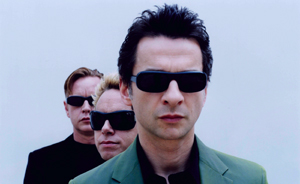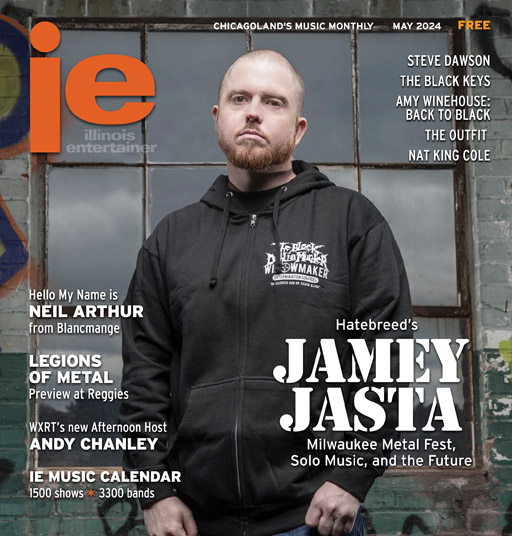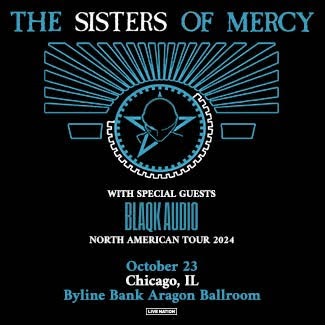Cover Story: Depeche Mode

Sick Sense Of Humor
Gargantuan techno/goth trio Depeche Mode has just released its 11th studio set, Playing The Angel on Sire/Reprise, possibly its darkest work since the mid-’80s masterpieces Black Celebration and Music For The Masses. And apparently, the album instantly reunited the group’s spooky faithful following — it debuted at number one in 10 countries and rocketed into the Top 10 both Stateside and in the members’ native England. And you’d think that the members lounging around their spacious Hollywood hotel suites one recent morning, would have some suitably sinister subjects to discuss, something malevelontly Mode-ian. But their attitudes, oddly enough, are as sunny as the day outside their open veranda doors.
For those uninitiated, it must be clarified Depeche Mode is already a quite curious proposition. Martin Gore, who lives in Santa Barbara, CA, pens the outfit’s songs on acoustic guitar, which he and fellow keyboardist Andy Fletcher — who still resides in London — then translate to synthesizer for vocalist (and resolute New Yorker) Dave Gahan to eerily intone. In other words, Gore blueprints the race car, Fletcher builds it, then Gahan jumps behind its wheel and screams off down the track. And Angel is quite the souped-up Munstermobile — more stark stock-in-trade sonnets like “Damaged People,” “The Sinner In Me,” “A Pain That I’m Used To,” and the Gahan-composed “Suffer Well” (one of three tracks he soloed on). After 50 million albums sold worldwide, the combo remains comfortably creepy, even on an anti-Bush-themed sendup of the traditional “John The Revelator.” But there’s an optimistic new twist fans won’t be expecting.
The Modesters (surprise, surprise) are all mid-40ish fathers now, with three kids apiece. And they’d much rather discuss their children than that boring old recording process. In fact, Gore wrote kickoff single “Precious” about his progeny, 14, 10, and three, in a poetic attempt to explain to them their parents’ pending breakup. “I don’t have to look too far for dark forces, because I’m in the middle of a divorce at the moment,” sighs the blond-haired, surfer-tan Gore, sporting a requisite black T-shirt, black jeans, and black brothel creepers. “And in my life, there haven’t been many times where I’ve felt like a failure, because we’ve managed to keep going as a band for 25 years. But when my marriage fell apart, I did feel like a failure, like I’d let my children down. And I really beat myself up for the first three or four months, when it became apparent that we were definitely over, but I realized that I had to move on. So I still see the children three or four times a week, when I’m home, and all that seems to be going well.”
Fletcher’s offspring are 15, 14, and 11, and they’ve grown quite comfortable with their dad’s surreal work schedule; in addition to DM duties, he also regularly jets around England and Europe as an in-demand club DJ, and owner of his own record label, Toast Hawaii. (His primary client is Client, a female techno pop duo.) And consequently albums, sighs the bespectacled redhead, “take a lot longer now. We don’t have that youthful enthusiasm anymore, so to keep the quality high, it just takes longer. In the early days, all we had was Depeche Mode to concentrate on, so we could just snap songs out. But as we matured, our music matured, as well.”
But it’s Gahan — whose kids are 18, 13, and six — who’s beaming with the grandest parental pride. And in interview, he’s always the anomaly — while Gore and Fletcher speak gravely, in somber tones about their craft, Gahan is goofy, giddy, an instantly likable, overgrown schoolboy who handles everything with a self-deprecating wit. And sure, he chuckles, “There’s some darkness to Playing The Angel, I think. And we’re lucky that we still get to make the records we wanna make, lucky that we get to do our own kinda thing in our own little bubble. And what I love about Depeche Mode the most is that we create something through luck that’s really quite unique, that lives whether the three of us continue to be part of it or not. It’s alive, a thing that fans hang onto and live by. I mean, there are places in Europe where there are clubs that are devoted to the band, and even Depeche Mode conventions that go on.”
Still, Gahan is happy to go on at length about his eldest son Jack, who’s become obsessed with collecting vintage vinyl from Pink Floyd, Led Zeppelin, and The Rolling Stones. Junior just dropped out of school, too, to follow in his father’s rock ‘n’ roll footsteps. And what can dad say, really? After enrolling his son in a posh U.K. guitar school, Gahan doesn’t know whether to be pleased or peeved. “I wanted him to stay in school because I wanted him to get some education that I didn’t get,” says the heavily tattooed singer, also dressed all in black, with a shock of spiky black hair shellacked back like Sonic The Hedgehog. “Which is, of course, me living vicariously through him, so that he doesn’t walk into this hellhole of a business and not have some savvy. But I’ll be there, I suppose, to help him with that. He’s living a dream that he wants to pursue, and so you just have to support that.”
Thanks to Jack, Gahan adds, he’s “seeing a real backlash to the [music industry] system, a system which has gotten worse and worse. Everything is formatted and arranged and perfectly packaged into what the industry seems to think that people want. And thank God there’s always an underground backlash to that, and it’s coming from teenagers.” Rather than rifle through record bins, fingers crossed for the latest find, his son merely surfs the Web, discovering overlooked new outfits and doing historical rock research, too. First, Junior traced his Zep/Stones fixation back to The Stooges, T. Rex, and The New York Dolls. “Now, he’s gone back to find all the old blues stuff,” says Pop, proudly. “And he’s doing that way younger than I did. I didn’t discover that kinda stuff until I was in my late 20s.”
It isn’t all fey familial fun in the DM universe these days, though. For a fast fix of creepiness, fans can slip into the sepulchral chambers of Playing The Angel, which opens with an air-raid-siren bang on the cauldron-roiling “A Pain That I’m Used To.” “It’s good to capture people’s attention,” smirks Gore, who wound up arguing with album producer Ben Hillier about the stunning sound effect. “So we actually had to turn the siren down because it was louder on the original version. Ben said it was nice to surprise people, but we were gonna be blowing people’s heads off, and then they’ll have to turn the rest of the album up.” And if Angel sounds particularly devilish, he adds, “that’s good, although we still have no concept of where it stands in our history . . .”
— Tom Lanham
For the rest of our exclusive interview with all three members, pick up the December issue of Illinois Entertainer.











